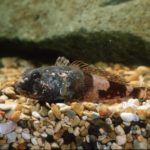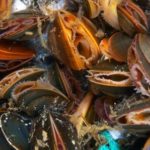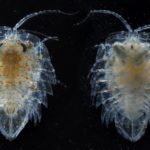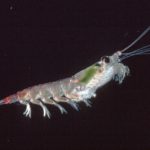The BAS marine aquarium is housed within the Controlled Environment Facility (CEF) on the BAS Cambridge site.
Marine animals collected from Antarctic waters have been maintained in aquarium facilities in Antarctica and the UK by the British Antarctic Survey (BAS) since 1973. The current Facility in Cambridge is the only low temperature research aquarium in the UK, and one of only three globally to regularly hold Antarctic species over extended periods. The facilities and marine animals are used by scientists and Ph.D. students at BAS and at universities, both within the UK and internationally.
In the Polar Regions where environmental change is the fastest on Earth the ability to investigate organism responses to manipulated conditions is a key requirement for UK-based research into Antarctic ecosystems and biodiversity.
The Cambridge Aquarium provides:
- The ability to perform fine-scale analyses on Antarctic species using techniques only available in Europe (e.g. NMR, proteomic and transcriptomic analyses adaptation to the cold and responses to change).
- Access to biological specimens for scientists year-round without having to travel to Antarctica.
- The ability to train junior scientists and Ph.D. students in Antarctic biology.
- The capacity to conduct preliminary trials and develop new small projects at times for grant applications.
- The ability to conduct long-term projects manipulation conditions over periods of years (our longest experiment was an ocean acidification study on sea urchins which lasted 2 years).
Facility Facts:
- 12 aquarium tanks maintained at temperatures between -0.2°C and 0°C.
- Air temperature is kept at -2°C
- Access to three experimental rooms: one is maintained at the same temperature as the aquarium, whereas in the other two rooms, the temperature can be raised to 25°C for temperate marine work.
Experimental advice and experimental equipment provided (along with warm clothing). To discuss further please contact us via CEF@bas.ac.uk.
For more details on this facility see Controlled Environment Facility (CEF)
Student projects:
Do Antarctic fish change colour? – Sam Matchette (University of Cambridge)
Camouflage is a widely adopted anti-predator strategy across the animal kingdom. Some animals, particularly fish, are even capable of changing their appearance to enhance their concealment when inhabiting different microhabitats and can do so over very short periods (seconds to minutes). Colour change, particularly rapid colour change, is expected to incur a high energetic cost, which can be influenced by many factors, particularly temperature. While we may predict the emergence of rapid colour change to be limited to taxa that live in habitats with optimal conditions, anecdotal evidence suggests that fish that live in waters with sub-zero temperatures can also exhibit rapid colour change. This project will test, for the first time, the extent to which fish in Antarctic waters employ dynamic changes to their skin patterns and/or colour intensity.
The Antarctic spiny plunderfish, Harpagifer antarcticus, is a small fish that lives amongst the rocks in shallow waters in Antarctica. Each fish has a highly individual skin pattern, with colours ranging from white, through grey and black to pink. This colour diversity is believed to enable these fish to hide amongst rocks. To test whether this species can change its colour intensity over very short time periods, we will quantify the extent of colour intensity change exhibited when H. antarcticus are sequentially exposed to two different backgrounds (one white, one black). Fish will be exposed to one background for 24 hours before being transferred to the other for 20 minutes. Photographs will be taken between stages and the final 20 minutes will be filmed to identify how fast these fish change their colour in response to different backgrounds. We predict that the appearance of each fish will significantly change within the final 20-minute exposure on a different coloured background, thus providing the first evidence of rapid colour change in an Antarctic species. If so, this finding would significantly alter our understanding of rapid colour change, including its ecological importance and physiological tolerance.
How does the environment influence starfish righting ability: from the tropics to the poles – Kei Fung Chan (University of Cambridge)
Many bottom-dwelling marine animals need to turn right-side up if they are inverted by waves or predators. In this respect, starfish are no exception, and their righting behaviour has previously been used as a metric of individual health (i.e. if they turn over quickly, they are healthy and more likely to survive predator attack). Our study investigates how different environmental parameters (such as the substrate they live on, e.g. sand, small pebbles or cobbles and slope of the “sea bed”) affect starfish righting, and the extent at which righting varies at the individual level. So far, we’ve found that starfish can detect and right towards a downslope while inverted and may perform less well on loose substrates. These findings shed light on the ecological and biomechanical constraints faced by these animals, providing further insight into how animals respond to change.

Marine Aquarium Manager
2 September, 2024
Cambridge researchers are set to explore the uncharted depths of life in the extreme cold, with findings that could reshape our understanding of biology and pave the way for future …
27 June, 2016
New technologies and techniques used in a scientific study of the shells of oysters, mussels, clams and scallops reveal clues about how these commercially valuable species may fare in a changing world, and how discarded shells from the aquaculture industry could benefit the environment.
24 June, 2015
Antarctic life – highly diverse, unusually structured A new assessment by scientists, published in Nature this week, suggests Antarctica is a more diverse and biologically rich region than previously thought. …
9 December, 2013
BAS takes the lead in ambitious science programme to aid fishing industry and monitor effects of climate change on Europe’s shellfish The supply of shellfish we buy at the supermarket …
21 August, 2013
Warming Antarctic seas likely to impact on krill habitats Antarctic krill are usually less than 6 cm in length but their size belies the major role they play in sustaining …
Are aquatic ectotherm communities in Antarctica uniquely adapted to thrive at sub-zero temperatures? If so, does this prevent the invasion by non-native species? How will this situation change in the …



